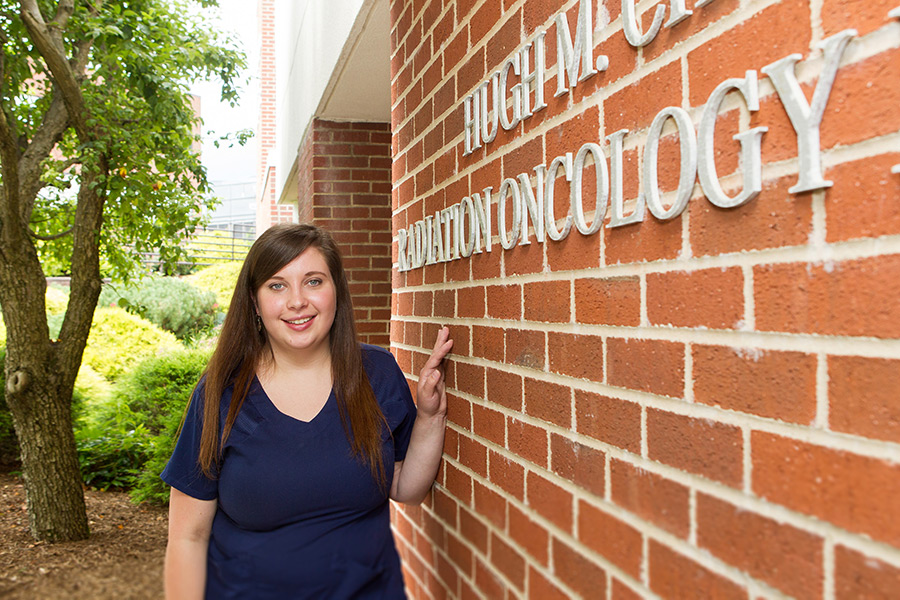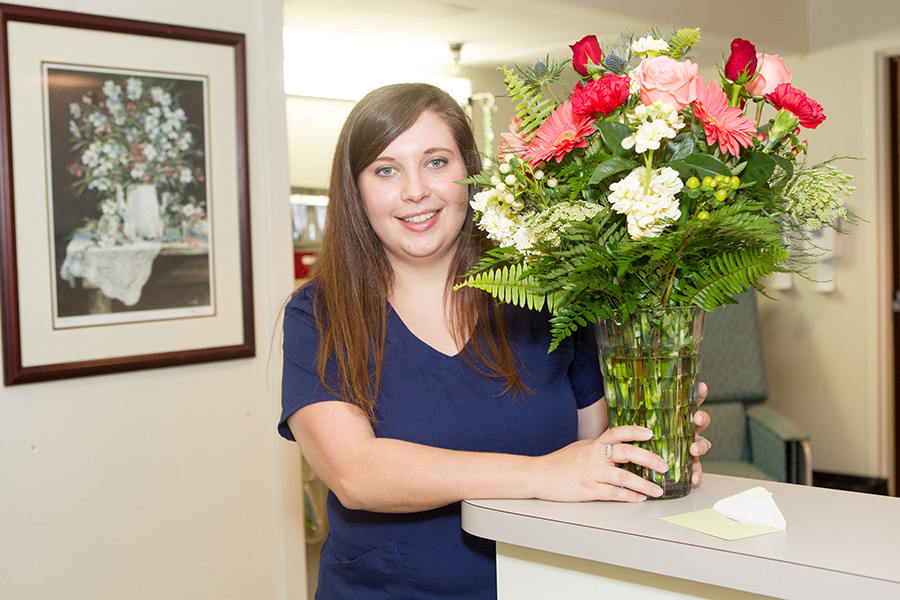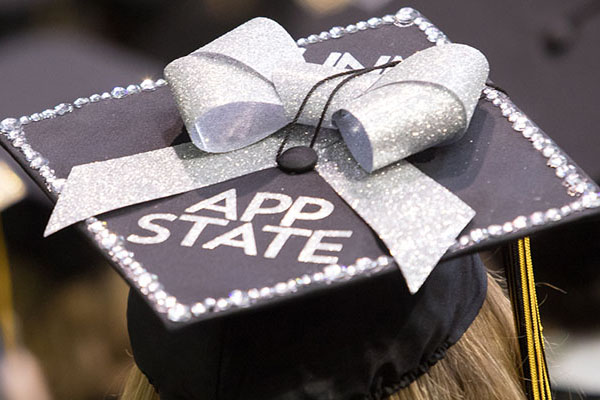Hannah Sheets ’14 has come back home.
Hannah Sheets ’14 is a member of the third graduating class of nurses from Appalachian State University’s Beaver College of Health Sciences. Her first position out of college was in the oncology unit of Wake Forest Baptist Health in Winston-Salem. Two years later she has returned to work at Watauga Medical Center’s radiation oncology department.
Her return coincided with the groundbreaking of the Beaver College of Health Sciences’ new facilities, the land for which was donated to the university by Appalachian Regional Healthcare System. Watauga Medical Center is part of that health care system. The mission of the college is to graduate more health care professionals and educators like Sheets to meet the critical and growing demand for health care in rural North Carolina and across the state.
At Baptist, Sheets was responsible for direct patient care, including giving medications, hourly rounding, drawing blood, charting and managing care on a vast array of patients from oncology to the Intensive Care Unit. For the most part, Sheets worked specifically with bone marrow transplant patients. “I love that patient population,” she said. “Bone marrow transplant is a life-changing thing. So much happens to those patients. They are on high-dose chemotherapy and they are really sick and you’re managing all that. Some stay in the hospital for the rest of their lives. I loved every one of them.”
At the radiation oncology unit, Sheets said, she is “responsible for new patient intake, drawing labs, occasionally giving medications, and working closely with Dr. [Yvonne] Mack and the radiation therapists.”
“Here it is autonomous,” Sheets said. “I run my own show. Sure, I have expectations I have to meet for Dr. Mack and the rest of the staff. But at Baptist, I had 12 hours and a list of patients to care for and a list of things I had to get done. I’m happy here.”
Sheets said she left Baptist because of her dissatisfaction with a new policy to increase the number of patients under her care. “I felt I would not be able to give what I wanted to my patients and that’s a big deal to me,” she said.
Another big reason for the move, she added, was “because it’s Boone! This is a nice place to be, a nice place to work.”
Sheets has a long history with the High Country and with Appalachian. When she talks about her life here, her love for the place, the people and her patients is palpable.
She had her first exposure with Appalachian as a high-schooler in the university’s Upward Bound program, which provides academic support to high school students so they may complete high school, enroll in college and successfully obtain a college degree. Qualifying participants come from families who meet federal income guidelines, or will be first-generation college students.
Upward Bound has probably changed since she participated, Sheets said, “but when I was in the program, we had tutoring sessions every week at my school. And then, during the summers we’d stay on campus and do tours and go camping. It was fun. It prepared you for being away from home, prepared you for going to college, ’cause you actually went to college.”
Despite the Upward Bound connection, Sheets said her parents told her “‘to aim low’ because they couldn’t afford to send me to a four-year university. But I was stubborn. And I found myself at Appalachian and the ACCESS program landed in my lap and here I am. I graduated with no student debt.”
Appalachian is committed to making higher education affordable for every North Carolina student and offers the Appalachian Commitment to a College Education for Student Success (ACCESS) program as a method to ensure that students from low-income families in North Carolina can attend Appalachian debt free. The ACCESS program offers such students a four-year university education at Appalachian debt free.
Sheets, originally from Millers Creek near Wilkesboro, was the recipient of the university’s first Kenneth E. Peacock Spirit of ACCESS Award for embodying the difference the ACCESS scholarship program was created to make in someone’s life. The award included $1,000 and a medallion.
Despite her success in school, “nothing can prepare you for being a nurse,” she said. “Not a test, not a class. However, I think the nursing program at App did the best they could. I was ready for the NCLEX [the nursing exam all nurses are required by the state to pass before licensure.] Most of the staff and faculty in the nursing program are passionate about nursing. It takes people like that to get people to want to do this. Nursing is not for everyone.”
Sheets plans to continue her education. “Not now,” she said. “But I will come back. Maybe for a nursing education degree or maybe for palliative care. Right now, I don’t know. When I do, I’ll tell my mom and she’ll say, ‘Hannah, keep your feet on the ground, come back to earth.’ She’ll tell me I’m crazy.”
Related links
What do you think?
Share your feedback on this story.
About Appalachian State University
As a premier public institution, Appalachian State University prepares students to lead purposeful lives. App State is one of 17 campuses in the University of North Carolina System, with a national reputation for innovative teaching and opening access to a high-quality, cost-effective education. The university enrolls more than 21,000 students, has a low student-to-faculty ratio and offers more than 150 undergraduate and 80 graduate majors at its Boone and Hickory campuses and through App State Online. Learn more at https://www.appstate.edu.





![How NCInnovation Is Rethinking Economic Development in North Carolina [faculty featured]](/_images/_posts/2026/02/rethinking-economic-development-600x400.jpg)








